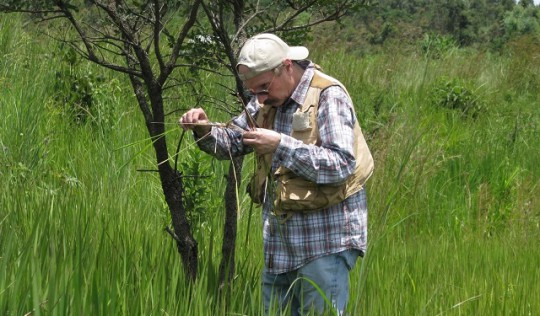UF/IFAS Researchers Find Potential Bugs To Eat Invasive Cogongrass
April 13, 2017
by UF/IFAS Extension Service
A few bugs may be able to chew up some cogongrass, a noxious weed that elbows out pasture grass, golf course greens and valuable ecosystems, a University of Florida Institute of Food and Agricultural Sciences researcher says.
A worldwide research team led by UF/IFAS entomology professor James Cuda and retired entomology professor Bill Overholt found species in Japan, East Africa and Indonesia that might help in the battle against cogongrass.
Among the arthropods they found, Cuda and his team discovered a midge from Indonesia that attacks cogongrass. Cuda and his team are focusing on the Orseolia javanica midge that causes cogongrass to produce linear galls at the expense of leaves. However, when scientists brought the arthropods back to the quarantine facility at the UF/IFAS Indian River Research and Education Center in Fort Pierce, Florida, they did not mate and increase in population.
So, scientists must conduct more research to determine how to rear the midge in the laboratory in order to evaluate its host specificity and impact on cogongrass, a rather ubiquitous weed in Florida and the southeastern U.S., said Cuda, a biological weed control specialist with UF/IFAS.
“This invasive grass infests cattle pastures, golf courses, lawns and also thrives in poor soil conditions such as ditch banks, roadside and railroad rights-of-way as well as reclaimed phosphate mining areas,” he said, adding that it grows quickly and alters the ecology of habitats it invades.
Cogongrass, introduced in the U.S. in the early 1900s as packing material and as livestock forage grass, causes the most expensive losses in pine plantations, where it outcompetes native ground cover and increases the frequency and intensity of fires, Cuda said. It also displaces native vegetation in sand hill communities in Florida.
Currently, cogongrass control is accomplished with mowing and herbicides, which can be costly and are not always effective. Cuda cited a 2009 report that showed the state of Alabama spent $6.3 million of federal stimulus funds exclusively for chemical control of the weed.
“Biological control using natural enemies from the native range of cogongrass has received little attention, and no biological control agents have been introduced anywhere in the world,” Cuda said. “That’s why we are investigating biocontrol agents for cogongrass. Biological control is more sustainable and can be integrated with conventional controls.”
The latest research on biological control of cogongrass appears in the journal Florida Entomologist.
Pictured: A worldwide research team led by UF/IFAS entomology professor James Cuda, seen above, and retired entomology professor Bill Overholt found species in Japan, East Africa and Indonesia that might help in the battle against cogongrass. Photo for NorthEscambia.com, click to enlarge.
Comments
4 Responses to “UF/IFAS Researchers Find Potential Bugs To Eat Invasive Cogongrass”




this grass is like our elected officals put one in office promise to do good a few years he is asbad as the one he replaced so we replace him with a new one the answer to the problem a few years and he is the problem the cycle never ends and the people pay the price in taxes or lost usable land IT NEVER ENDS
Well the grass is gone…now the bugs are eating everything else….this will soon be the headlines…..kinda like kudzu for erosion…now its everywhere. Oh well in the name of progress lets give it a shot
Yes, Willis is right! Look at Hawaii’s history of introducing invasive species & making things worse for their efforts. The use of chemicals has it’s drawbacks as well, but they won’t start eating other grass when the cogongrass is gone.
Lots of things have been brought in to be the answer for different reasons…..
And soon became the issues needing answers.